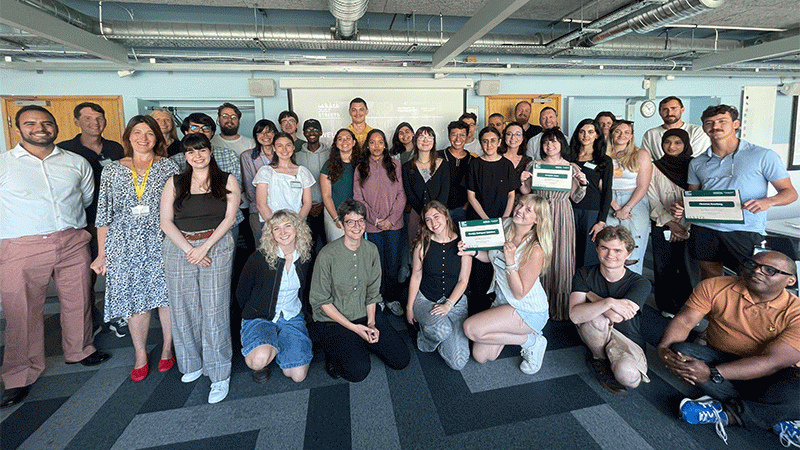The University of Westminster recently collaborated with Texas State University in the United States for the JUST STREETS Summer School. The week-long international programme brought together undergraduate and postgraduate students to explore themes of urban justice, sustainability and inclusive street design.

Hosted by the School of Architecture + Cities and held between 23-27 June, the week included visits to key locations across London, where Westminster researchers are already actively engaged with local partners. Students explored urban sites in Camden, Lambeth and Southwark, gaining insights from city planners and local stakeholders, including Camden High Line, Lambeth Council, Southwark Council and Cross River Partnership.
The Summer School is closely tied to the JUST STREETS research project, led by Professor Enrica Papa, Professor of Transport Planning, Dr Sabina Cioboata, Research Fellow at the School, and Martha Sainsbury, Project Administrator at the University. The project focuses on promoting international and cross-sectoral collaboration to examine how streets can be designed and governed in more inclusive, accessible and equitable ways across Europe.
During the week, students embarked on a walking tour from King’s Cross to Camden along Regent’s Canal, followed by a presentation from Roisin Morrison, Camden High Line’s Head of Development and Alex Ross, Camden High Line’s Community Engagement Officer. They also went on field visits to Waterloo which was led by Luuk van Kessel, Principal Transport Planner at the London Borough of Lambeth, and Lambeth St Mark’s Primary School, led by Sam Dillon, School Streets Manager at the London Borough of Lambeth, to examine street design and school access as part of Lambeth’s School Streets programme.
JUST STREETS is an international €11 million Horizon Europe project with 32 international partners including ten cities, academic partners, international organisations and private sector actors. The project focuses on redeveloping streets to make them more sustainable, safe and inclusive for all citizens and aims to shift from car-dominated areas to spaces that support more active and sustainable forms of mobility which prioritise the needs and perspectives of social groups often under-represented in urban planning. These include women, migrants, the elderly, children, LGBTQ+ individuals and people with disabilities. The approach also aims to link inclusive street design with broader climate goals, such as lowering emissions and promoting the use of renewable energy.
Collaborative workshops and group projects were also hosted on the University’s Marylebone Campus, where students presented to external guests. For the workshops students from both universities were divided into mixed interdisciplinary teams of urban designers, architects, planners, transport planners and environmental scientists. They worked on sites in London, such as The Cut and Lower Marsh in Waterloo, which are two street redesign schemes aimed at calming traffic and revitalising the area. They also worked on Camden High Street, which is currently trialing pedestrianisation, and Camden Gardens, the entrance to the proposed High Line project. The students analysed these sites and schemes and proposed innovative design and planning recommendations to take them further.
About the Summer School, Dr Sabina Cioboata said: “It was so inspiring to watch our brilliant participants build interdisciplinary and cross-cultural bridges and come up with thoughtful and creative design and planning solutions that reimagined London’s streets.”
One participating student added: “I'm inspired to propose radical solutions and really think about ways streets can be resilient to climate while having community at the heart.”
Another said: “I learned so much that it’s difficult to narrow it down, but most importantly, I learned how beneficial and enriching it is to work in a multidisciplinary team.”
The Summer School directly contributes to the United Nations Sustainable Development Goals (SDGs) 4: Quality Education, 11: Sustainable Cities and Communities and 13: Climate Action. Since 2019, the University of Westminster has used the SDGs holistically to frame strategic decisions to help students and colleagues fulfil their potential and contribute to a more sustainable, equitable and healthier society.
Learn more about Architecture, Interiors and Urban Design courses at the University of Westminster.






